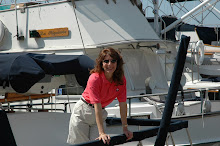BOATING SCHOOL IS REAL FUN
By Barb Hansen
January 2011
At least 76 died in Florida boating accidents in 2010. The count does not include two men who slammed their airboat into a tree on dry land.
This was Florida’s Fish and Wildlife’s Dec. 15 total. We can assume that just before midnight on New Year's Eve a few more fell off wobbly boats and drowned even as they held firmly to a cup of good cheer. It will be determined that about 85 percent of these "victims" were not wearing life jackets.
I think Florida's stats, times ten, are a reasonable proxy for U.S. totals. The United States Coast Guard reported 736 boating deaths in 2009.
Boating fatality reports are usually accompanied by a recommendation -- I vigorously concur -- that boaters take a boating safety course.
I would add only that fools and/or drunks need not apply. I just read about one bass boater racing to be first to his honey hole. Speeding 75 mph in a narrow creek he failed to navigate a sharp bend and accompanied the boat on a high-speed cross-country expedition.
Boating how-to instruction is also about boating safety. At Florida Sailing & Cruising School almost everything taught during our three-day liveaboard course, Basic Powerboat Handling (P-101), concerns boating safety. It includes instruction about how everything on the boat works and what to do if it doesn't.
Lessons: Bring spares. Become a do-it-yourselfer. Know how to get rescued and how to keep everybody alive while you wait.
You can also go to "school" by reviewing previous boating accidents to determine what should have been done differently.
The case of the Gouge family rescue – four men and three male children – is one such accident. In September, while fishing 21 miles offshore of Charleston, S.C., their 38-foot boat started taking on water in the engine compartment.
Could the leak have been prevented? Could it have been fixed or minimized after it started? What about a manual bilge pump or a bucket brigade?
The flooding got worse. They called for help on a marine radio but the signal heard by the Coast Guard was garbled. The boat was 21.5 miles from shore but the Coast Guard thought it was 1.5 miles from shore. Were there no backup radios? Could the call for help have gone out sooner?
As the water poured in one person onboard collected cell phones and flares and stowed them in a forward compartment. But later a wave rushed aboard and swept all of it into the water. Where would you have put them?
The Coast Guard restarted the search at 10 p.m. after one of the wives phoned from home. Sharp crew eyes aboard one of the CG copters noticed a break in the moon’s reflection on the water. Bingo. They were able to save all seven. They were wearing life preservers. But why were they not in a lifeboat?
Some people say stop it already with this fear stuff. They say that nobody will ever buy or charter a boat if all they hear about is what can go wrong.
I say confront these issues before pushing off. You'll have a lot more fun knowing you are prepared.


0 Comments:
Post a Comment
<< Home